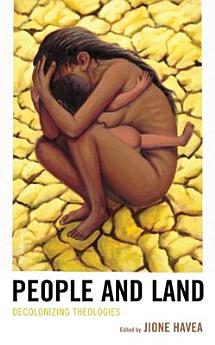People and Land: Decolonizing Theologies
Jione Havea
nov 2019 · Bloomsbury Publishing PLC
Libro electrónico
230
Páginas
reportLas calificaciones y opiniones no están verificadas. Más información
Acerca de este libro electrónico
Empires rise and expand by taking lands and resources and by enslaving the bodies and minds of people. Even in this modern era, the territories, geographies, and peoples of a number of lands continue to be divided, occupied, harvested, and marketed. The legacy of slavery and the scapegoating of people persists in many lands, and religious institutions have been co-opted to own land, to gather people, to define proper behavior, to mete out salvation, and to be silent.
The contributors to People and Land, writing from under the shadows of various empires—from and in between Africa, Asia, the Americas, the Caribbean, and Oceania—refuse to be silent. They give voice to multiple causes: to assess and transform the usual business of theology and hermeneutics; to expose and challenge the logics and delusions of coloniality; to tally and demand restitution of stolen, commodified and capitalized lands; to account for the capitalizing (touristy) and forced movements of people; and to scripturalize the undeniable ecological crises and our responsibilities to the whole life system (watershed). This book is a protest against the claims of political and religious empires over land, people, earth, minds, and the future.
The contributors to People and Land, writing from under the shadows of various empires—from and in between Africa, Asia, the Americas, the Caribbean, and Oceania—refuse to be silent. They give voice to multiple causes: to assess and transform the usual business of theology and hermeneutics; to expose and challenge the logics and delusions of coloniality; to tally and demand restitution of stolen, commodified and capitalized lands; to account for the capitalizing (touristy) and forced movements of people; and to scripturalize the undeniable ecological crises and our responsibilities to the whole life system (watershed). This book is a protest against the claims of political and religious empires over land, people, earth, minds, and the future.
Acerca del autor
Jione Havea is a native Methodist pastor from Tonga and research fellow with Trinity Theological College (Aotearoa) and the Public and Contextual Theology (PaCT) research centre of Charles Sturt University.
Califica este libro electrónico
Cuéntanos lo que piensas.
Información de lectura
Smartphones y tablets
Instala la app de Google Play Libros para Android y iPad/iPhone. Como se sincroniza de manera automática con tu cuenta, te permite leer en línea o sin conexión en cualquier lugar.
Laptops y computadoras
Para escuchar audiolibros adquiridos en Google Play, usa el navegador web de tu computadora.
Lectores electrónicos y otros dispositivos
Para leer en dispositivos de tinta electrónica, como los lectores de libros electrónicos Kobo, deberás descargar un archivo y transferirlo a tu dispositivo. Sigue las instrucciones detalladas que aparecen en el Centro de ayuda para transferir los archivos a lectores de libros electrónicos compatibles.








